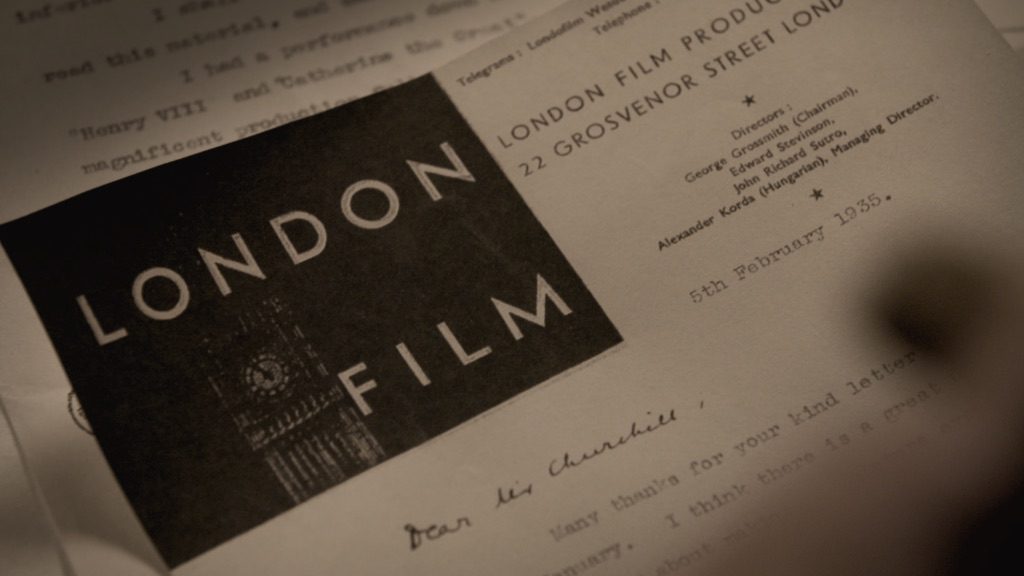
Churchill and Movie Mogul Alexander Korda, by John Fleet
John Fleet is a filmmaker who has produced an excellent documentary on Winston Churchill and Alexander Korda. Their collaboration in movie making, though not widely known, was substantial. A trailer for “Churchill and the Movie Mogul” may viewed online. For the full lecture, including Q&A—or the option of reading a transcript—click here.
A Treat Instead of a Treatment
We always begin watching any new film about Churchill with trepidation. After the skewed portraits in the television series The Crown, the fake history about postwar India in Viceroy’s House, and the absurdities of Churchill played by Brian Cox, we are fearful of having sit through another slapdash, ill-researched portrait. With certain exceptions, Churchill documentaries have gone from faithful reporting to imaginary fantasizing. It’s not unique to Churchill. It’s “The Trouble with the Movies.”
Happily, as John Fleet’s production unfolded, we can relax with this one. It is an honest look at a little-known aspect of Churchill, his career as a screenwriter. There are no fashionably dishonest critiques, so popular in the media today. Fleet delves deeply into the best sources, interviewing the right people, who know what they’ve talking about. We hope John is successful in its production. “Churchill and the Movie Mogul” is a treat, instead of a treatment.
Churchill and Korda, by John Fleet (Excerpts)
Herewith brief excerpts from Mr. Fleet’s remarks at the Hillsdale Conference, “Churchill and the Movies” in March 2019. The last of four 2018-19 seminars by the Center for Constructive Alternatives. For a video or transcript (the latter is the original text with added passages), click here.
You might ask though, why should these two men be brought together? Well, first and foremost, they shared love of history, and more importantly the parallels that can be drawn from it. The Private Life of Henry VIII was a comedy film but it didn’t miss an opportunity to make a contemporary parallel. In one scene, King Henry VIII turns to his advisor, Thomas Cromwell, and says that “if those French and Germans don’t stop cutting each other’s throats what’s to stop ‘em cutting ours…”.
The first signifiant project that Korda asks Churchill to work on is a documentary-drama about the last twenty-five years of the reign of the monarch, George V, to coincide with his upcoming jubilee celebration. Churchill thought this was fantastic and he said to Korda, “I will side-track everything else.” He was already very far behind on the next volume of his biography of Marlborough at that stage.
But Churchill saw this film as an opportunity to deliver, what he described as a “serious, massive appreciation of England and her Empire.” And within a week or ten days, he had written an epic screenplay. I must preface this by saying that the film, sadly, was never made, but I would like to take a moment just to explore its underlying politics, which I think are very revealing.
“An Idea of Britain”
Korda and Churchill remain in contact now throughout the decade…. What Churchill becomes for Korda in a sense now is a historical advisor and what’s revealing is that his next big hit is another period epic, called Fire Over England. This film depicts Henry VIII’s daughter, Queen Elizabeth I, and her fight against the Spanish Armada. It is another excellent bit of England-building.
The central character, Queen Elizabeth, is no comedy figure like her father, Henry. She is a powerful and inspiring war leader. And she is presented as the embodiment of Britain, played by Flora Robson. She even says at one point “I am England.” in a wonderful bit of screenplay dialogue. The film then conveniently presents England as the underdog. It’s seen as this small island standing alone against an aggressive dictator, who in this case was King Philip of Spain—who is standing in for Hitler at this point. It was made in 1937. So, this is another bit of England-building that Korda made.
* * *
After the war, Churchill and Korda remained in touch. Korda gave Churchill the gift of a home cinema at his house at Chartwell—as a sign of his admiration. And they would spend evenings together smoking cigars, drinking brandy and watching movies. There are varying reports but I think Churchill notched up seventeen viewings of That Hamilton Woman in all.
The two remained friends for the rest of their lives and when Churchill was being inundated with offers for film projects from all over the world, he decided that what he would really like to do was to make a film with Korda. They started a plan to make a documentary about his life, but sadly only the first page of the outline survives, as Korda died a few months later. But I can tell you this, the film was to begin with his ancestor Marlborough.
And so ends the story of these two men, who in a uniquely 20th century, cinematic sense – imparted to us an “idea of Britain” – and by extension, the western world, at an extremely important time.
So, I take my hat off to them in deep gratitude and hope that their legacy and the lessons that they imparted to us will continue to endure.






